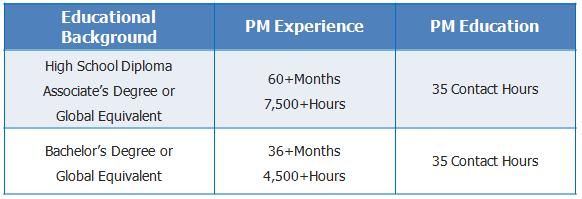Brief Introduction to PMI®:
- Project Management Institute (PMI)® is a not-for-profit association.
- Established in 1969.
- Global organization based in Pennsylvania, USA.
- Over 500,000 members spread across more than 171 countries).
- PMI® is actively involved in advocacy for the profession, setting professional standards, conducting research and providing access to a wealth of information and resources.
- PMI® also promotes career and professional development and offers certification, networking and community involvement opportunities.
Different Certifications From PMI®:
PMI® offers the following credentials for Project Managers:
- Certified Associate in Project Management (CAPM) ®
- Project Management Professional (PMP) ®
- Program Management Professional (PgMP) ®
- PMI® Agile Certified Practitioner (PMI-ACP) ®
- PMI® Scheduling Professional (PMI-SP) ®
- PMI® Risk Management Professional (PMI-RMP) ®
- Portfolio Management Professional (PfMP) ®
The eligibility criteria for each of these certifications are different.
Introduction to PMP®:
PMI’s Project Management Professional (PMP)® certification is the most important industry-recognized certification for project managers. It is globally recognized and in-demand, as it demonstrates experience, education and competency of the certified professional. This is one of the reason for large companies to look for certified professionals.
Here’s a presentation on this topic:
Job Responsibilities of a PMP® Certified Professional:
The role of a Project Manager includes the following:
- Generating plan
- Coordinating
- Implementing
- Finalizing projects according to specifications and deadlines
- Keeping the project under budget
- Defining the project’s objectives and schedules
- Ensuring quality control throughout the project
- Attaining resources, managing team and consultants
- Assessing and minimizing project risks
Pre-Requisites for Taking Up PMP Exam:

When taking up the PMP® exam, one needs to make sure of the following:
- Project duration must not overlap
- Experience in projects during last 8 years
- 20% of applications are picked up for random audit
- Designation during the specified project management work does not matter
PMP® Exam Pattern:
To successfully complete the exam on time, one must be aware of the pattern of the exam, to plan and execute them accordingly.
- It is a Computer based exam are conducted in Prometric centers.
- There are a total of 200 multiple-choice questions, mixed randomly across process groups, that needs to be answered in 4 hours.
- Out of 200 questions, 175 are for final marking and the remaining 25 are ‘Pre-Test’ questions.
- There are no negative markings in the exam.
- The examination is developed by groups of individuals from around the globe who hold PMP® credential.
- On clearing the exam, you will receive the PMP® certificate by mail within 2 months.
- Examination scores are confidential.
PMP® Examination Blueprint:
PMBOK® Guide:
PMBOK® Guide is a “distilled version” of Project Management body of knowledge and it coexists with the corresponding application area knowledge, general management skills and interpersonal skills. PMBOK® Guide is published by PMI® and inputs from practitioners and academics have been included.
Got a question for us? Mention them in the comments section and we will get back to you.
Related Posts:
Why Companies Hire PMP Certified Professionals
PMP is a registered mark of Project Management Institute, Inc. Edureka is a Global PMI® REP: ID 4021